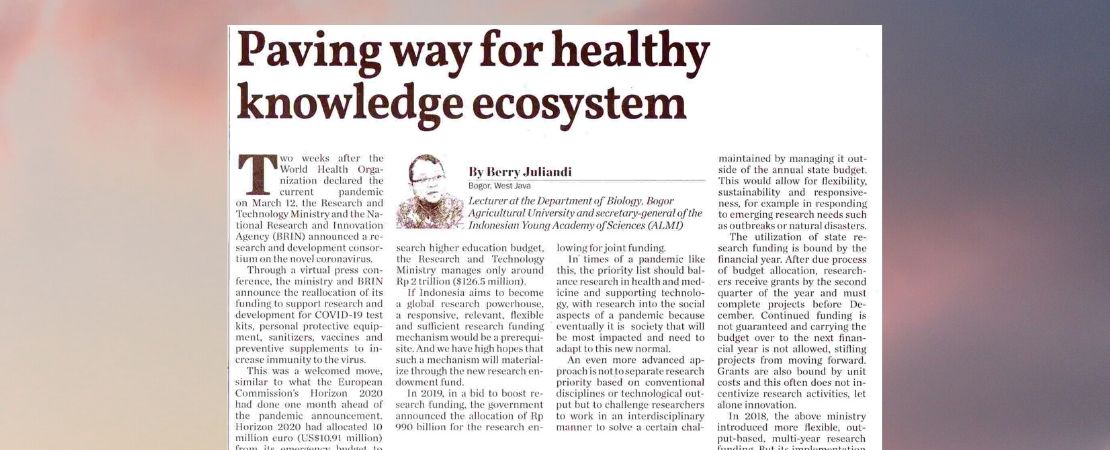Article published on The Jakarta Post, 14 April 2020
Two weeks after the World Health Organization declared the current pandemic on March 12, the Research and Technology Ministry and the National Research and Innovation Agency (BRIN) announced a research and development consortium on the novel coronavirus.
Through a virtual press conference, the ministry and BRIN announce the reallocation of its funding to support research and development for COVID–19 test kits, personal protective equipment, sanitizers, vaccines and preventive supplements to increase immunity to the virus.
This was a welcomed move, similar to what the European Commission’s Horizon 2020 had done one month ahead of the pandemic announcement. Horizon 2020 had allocated 10 million euro (US$10.91 million) from its emergency budget to “advance understanding of the epidemic, contribute to more efficient clinical management of patients infected with the virus, as well as public health preparedness and response.”
In Indonesia, the funding reallocation from the ministry and BRIN soon yielded results. By April 6, the COVID–19 consortium handed over 10 mobile handwashers and hand sanitizers to the national COVID–19 task force.
This is research and development at its best: responsive and relevant.
But responsive, relevant science does not just happen. On top of proper research infrastructure and scientific capabilities, funding is crucial to make research happen. The funding needs to be responsive and relevant, with a degree of flexibility to enable good research.
The most recent announcement of the 2020 state budget revision — announced through a new presidential regulation on budget reallocation — includes separation of the nonresearch higher education budget from research funding for higher education.
This separation of funding reveals how small Indonesia’s research and development budget actually is.
And this separation of funding reveals how small Indonesia’s research and development budget actually is. Without the non–research higher education budget, the Research and Technology Ministry manages only around Rp 2 trillion ($126.5 million).
If Indonesia aims to become a global research powerhouse, a responsive, relevant, flexible and sufficient research funding mechanism would be a prerequisite. And we have high hopes that such a mechanism will materialize through the new research endowment fund.
In 2019, in a bid to boost research funding, the government announced the allocation of Rp990 billion for the research endowment fund, with an additional Rp 5 trillion allocated in 2020.
So far, this remains unchanged, even with recent state budget reallocations to mitigate the economic impact of the pandemic. Any change should be a topped–up budget instead of slashed down as Indonesia’s level of funding for research is still far below its Southeast Asian counterparts.
In 2017, the country spent only 0.25 percent of its gross domestic product (GDP) on research, which pales in comparison to Thailand’s 1 percent and Vietnam’s 0.5 percent according to a 2019 UNESCO report. On a macro level, the research endowment fund should complement other forms of research funding via well–designed portfolio management. The fund should balance support for government priority research and discovery research, top–down and bottom–up research, and interdisciplinary and sectoral research, as well as allowing for joint funding.
In times of a pandemic like this, the priority list should balance research in health and medicine and supporting technology, with research into the social aspects of a pandemic because eventually it is society that will be most impacted and need to adapt to this new normal.
An even more advanced approach is not to separate research priority based on conventional disciplines or technological output but to challenge researchers to work in an interdisciplinary manner to solve a certain challenge. This challenge–led research will force brains from different disciplines to complement each other.
Research funding should not only focus on how much is being spent. Importantly, it should focus on how it is being spent and how it is allowed to be spent, which takes us back to the point of having a responsive, relevant, flexible research funding mechanism, with strategic spending.
The root cause of the problem is perhaps the barely existent management of a research funding portfolio and the fact that research funding via the state budget is restrictive. This does not enable good research. The new endowment fund for research supposedly provides some space for the budget to be treated differently from the annual state budget. After being invested, its yield can be accounted for as nontax state income.
Thus, the main added value of having such a fund should be maintained by managing it outside of the annual state budget. This would allow for flexibility, sustainability and responsiveness, for example in responding to emerging research needs such as outbreaks or natural disasters.
The utilization of state research funding is bound by the financial year. After due process of budget allocation, researchers receive grants by the second quarter of the year and must complete projects before December. Continued funding is not guaranteed and carrying the budget over to the next financial year is not allowed, stifling projects from moving forward.
Grants are also bound by unit costs and this often does not incentivize research activities, let alone innovation.
In 2018, the above ministry introduced more flexible, output–based, multi–year research funding. But its implementation covers less than 10 percent of the state research budget and it is still impeded by wariness on the financial audit side.
One of the key principles of research funding is to fund good research wherever needed. Hence, the endowment fund should be accessible to different categories of researchers — those based in universities, government research institutes, think tanks and even the private sector.
In finding good research to support, typically a competitive, peer–reviewed mechanism works most efficiently. This is as long as relevant scientists do reviews through a system that allows for feedback loops to help researchers improve their proposals. Such a review mechanism also allows for funders to support the most relevant research.
Applying these principles in funding research in Indonesia — accompanied by continuous debureaucratization and capacity building for researchers and research institutions — would support a healthy knowledge ecosystem. And a healthy, functioning knowledge ecosystem would ensure that our society is agile enough to cope with any changes, even abrupt ones like the current pandemic.




